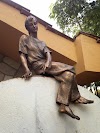From today's homily at the Cathedral
Mark 10: 46 - 52
Mark 10: 46 - 52
I believe the story of Bartimaeus is a familiar one. He is a blind beggar. The moment he hears Jesus is passing he cries out: ‘Son of David, Jesus, have pity on me.’ Jesus calls him and asks him: "What do you want me to do for you?".
Not sure you remember but even last Sunday Jesus asked the same question to James and John when they told Jesus: “Teacher, we want you to do for us whatever we request.” He asked them: "What do you want me to do for you?". As they shared with him their wish to have special places in his glory Jesus replied: "You do not know what you are asking".
Reflecting on this I realized that we all agree that Bartimaeus was a blind beggar but never consider that even James and John are blind. They walk with Jesus but are unable "to see" his way. What they asked for is clearly against what Jesus had been preaching.
This is not the only example. Before today's passage, the Gospel of Mark presents other examples of "blind" people who might not be blind in their eyes but in their minds and hearts:
- the apostles wondering who was the greatest among them;
- John telling Jesus how they stopped someone doing miracles in his name because he did not belong to their group;
- the apostles stopping children from going to Jesus to be touched by him;
While Bartimaeus is aware of being blind, none of the others seem to be aware of their blindness. None of them feel the need to ask Jesus to open their eyes. They believe they can see clearly.
Today's Gospel passage gives us an opportunity to wonder what in our lives does not help us to see or to see clearly:
- Media. Media is powerful and can condition the way we see things. If you watch the news on eSwatini TV you might never be aware of the situations of violence in our country and believe things are OK.
Social media is able to open our eyes and that is why we might find ourselves unable to access some of them like Facebook, WhatsApp and Twitter when someone believes it is better for us not to see.
It is also true that social media offers an amount of misinformation that confuses us and makes us fear. The recent experience with the COVID19 vaccines is a clear example. It has not been easy for many to believe there is nothing they should fear.
- Anger. While media is something that comes from "outside" us, anger comes from inside us. When we are led by anger, we do not see, we do not listen, we do not think properly. Anger makes us blind. I still remember the young people I met on my way from Mbabane on June 29 and the anger in their eyes.Tragically, a number of families has also experienced that type of anger at home. They live in fear.
- Power. We know the expression: "power corrupts and absolute power corrupts absolutely". When led by this type of power (wishing to control everyone) we become blind.
It applies to any type of leadership: being government, in our churches, in our families. It is seen when we want to have the first and final word, when we want everyone to do as we say. Whoever thinks differently becomes a threat.
The list can be long: what about being led by "fear"? How does the way we were brought up conditions the way we see things? What about those trained in the security forces: are they able to challenge what they are being taught or do they have to adapt or go? What about social pressure?
This is not a small thing. In Luke 6:39 Jesus wonders if a blind person can lead another blind one. It is therefore essential for us not to live as people who think they can see clearly the context in which we live. It is essential we make Bartimaeus prayer our own: "Master, let me see again." We need Jesus to open our eyes, our minds, our hearts.
It is a difficult time in our country and I have been wondering about what was announced yesterday regarding a national dialogue next year - esibayeni.
I wonder if it is decision taken with a clear eyesight or out of blindness. I wonder about it for two reasons:
- for the last four months some of us have been calling for urgent steps towards a national dialogue. Nothing has happened up to now. Announcing it for next year "sees" no urgency in this matter;
- deciding it will be done "esibayeni" ignores the constant call for a different type of dialogue. In fact, at the end of their solidarity and pastoral visit, the Southern African Catholic Bishops Conference (SACBC) spoke about the need for a dialogue about dialogue aware of the different views on this matter.
Time will tell.
I also wonder what the reaction to this decision will be. Are we going to allow anger and violence to lead us or will we be able to discern other ways?
May Bartimaeus' prayer be our own today and in the coming days in a special way: ‘Son of David, Jesus, have pity on me. Let me see again’
(Photo: faithlife sermons)




